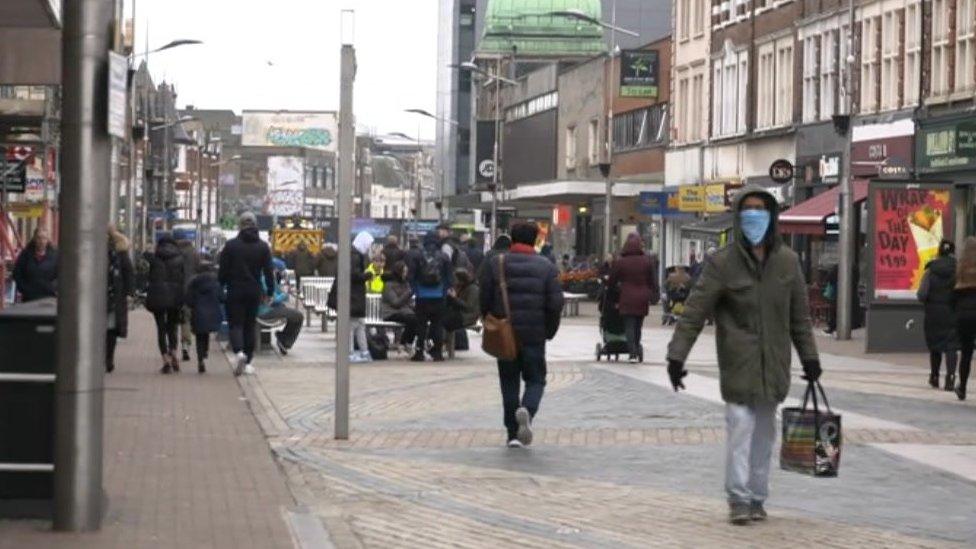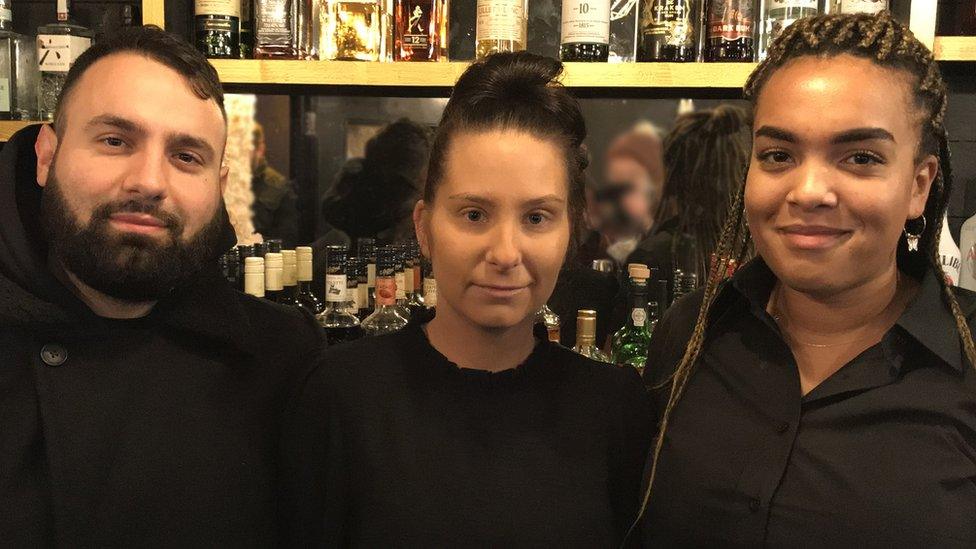Southend: The city-to-be where a quarter of shops are shut
- Published

The popular coastal town of Southend has been hit hard by the pandemic
A new report by the Centre for Cities has laid bare the havoc caused by Covid on the economic health of towns and cities across England. What does it mean for Southend, the town poised to become the UK's newest city, where a quarter of town centre shop units currently lie empty?
The pledge to make Southend the UK's newest city was made after the death of Sir David Amess, whose long-standing dream of city status was almost legendary amongst his colleagues in Parliament.
But a report by the Centre for Cities, external found Southend had the seventh highest proportion of empty town or city centre shop units in the country.
What does it mean for those in the town and what, if anything, can be done to get Southend's life as a city off to a better start?

'We survived, that's what it's about'

Alan Dadswell's toy shop survived thanks to a mix of loyal customers and government help
Independent business in the town paint a mixed picture in terms of the pandemic's effect. Some have struggled or just about pulled through but for others, being forced to adapt has led to business thriving.
Alan Dadswell, 65, owns Toys N Tuck, which first opened in 1995.
He says he's thankful the shop has survived but says without government grants and the furlough scheme it would not have been possible.
"It was really challenging but, with the support of our customers and the government through furlough, we made it through, we survived and that's what it was about," he says.
The initial closures were a real shock and business "fell off a cliff" in store, Mr Dadswell adds.
Sales eventually picked up online and a bumper Christmas last year was a welcome relief, he says.
As for the future of Southend's shops, Mr Dadswell thinks the unforgiving shop closures are disproportionately affecting national chains rather than independent shops.
He says: "Christmas was very good, very strong for us. I think it's because local people have supported local shops and we thank them for that.
"Maybe national chains struggling in areas, the High Street got a lot empty units."
'Really frightening at the start'

Heidi Webster's floristry business was forced to adapt after it's main source of income was cut off
Heidi Webster, 39, was terrified when the first lockdown hit. Her florist business Made You Look up relied heavily on weddings, events and corporate clients, all of which stopped abruptly when lockdown happened.
She says: "At the start it was really frightening, not knowing what was going to happen how long we were going to be shut for or when we could continue run our business as we'd always done."
After the initial shock wore off, she was able to adapt the business and turn things around.
"Having lost our main business of weddings, big events and corporate clients that we lost at the start of the pandemic, we adjusted what we offered and opened more as a shop [when able] and basically turned it around and also got the income we lost through offering local deliveries," she says.
She also believes that the pandemic led to local businesses forming more of a community to help each other survive and feels more people stayed shopping independently.
"Southend High Street as a whole, I don't know what went wrong there and why it's so empty and desolate. Where we are, small businesses are opening," she says.
'It's just dead'

Dee Mueller says footfall is still down and people appear put off shopping in person
Not all businesses in Southend are positive about the future.
Dee Mueller runs the boutique D'Marie Beauty and Fashion and says she thinks people have been put off shopping in person by the pandemic.
She says: "We were closed a number of times and it was very hard and tough because people don't want to come any more.
"They're scared, although we have everything from sanitiser and wearing masks, it's just dead. I've really struggled. December and Christmas was meant to be booming or busy but it was dead last year."
She credits loyal customers with helping the boutique survive and wants to see more invested by the local authority to make Southend more of an attractive place to shop.

You might also be interested in:

'Not all doom and gloom'

Leader of the council Ian Gilbert says high streets need to change going forward
Ian Gilbert, the leader of Southend-on-Sea Borough Council, admits that the number of empty shop fronts on Southend's High Street is a concern but believes it's "not all doom and gloom" going forward.
He says: "I think High Streets up and down the country are finding it difficult at the moment and it is a concern, clearly. Nobody likes to see empty shops but I think there's also reasons for optimism.
"The High Street remains busy, Southend remains busy and a popular destination so I don't think it's all doom and gloom.
He pointed to the rise of online sales and impact of the pandemic for why the High Street in particular has struggled.
Going forward, he says the council is looking a "bigger physical changes" starting with finding more occupants for the Victoria Shopping Centre, which the authority recently acquired.

Find BBC News: East of England on Facebook, external, Instagram, external and Twitter, external. If you have a story suggestion email eastofenglandnews@bbc.co.uk, external
Related topics
- Published5 September 2021

- Published11 December 2021

- Published2 September 2021

- Published24 January 2022
